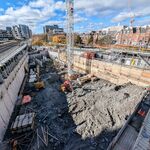just because there are inferior highrise buildings doesn't mean you can come to such a conclusion. There are plenty of subpar low rise buildings with shoddy quality too. A life span of 20 years? I live in a building completed in 1997, and there is absolutely no sign that it is about to collapse or beyond repair. What about those towers in Hong Kong and Tokyo which are more than 50 years old?
Lowrises are fine as long as people living in them don't completely rely on cars for everything, and they are not so big that heating and cooling them takes an enormous amount of energy.
regarding which is more sustainable, just think about this: how long can the world last if every single person live in a typical single family house with North American lifestyle (energy usage)?
You are kidding yourself in thinking the suburban house living is "sustainable" - it is probably comfortable for you, only because 95% of world's population don't consume nearly as much energy as you do, and if all of us do as you do, the earth will be depleted within 10 years. Sustainable?




